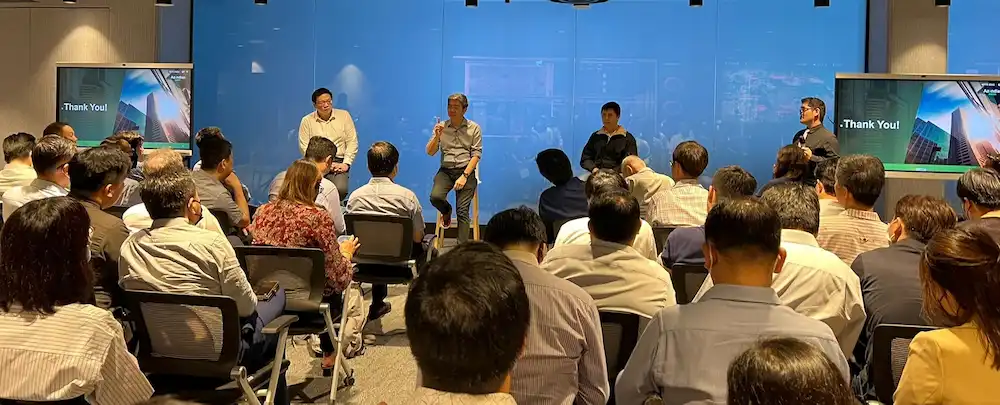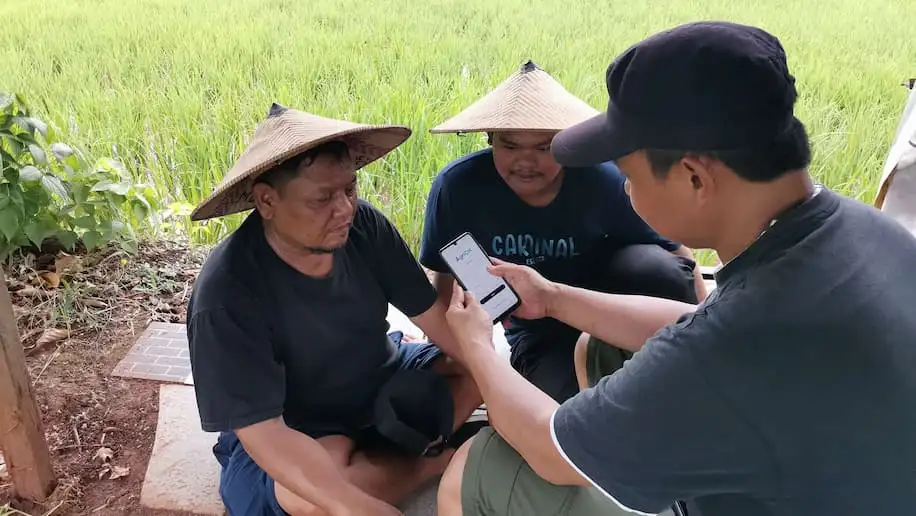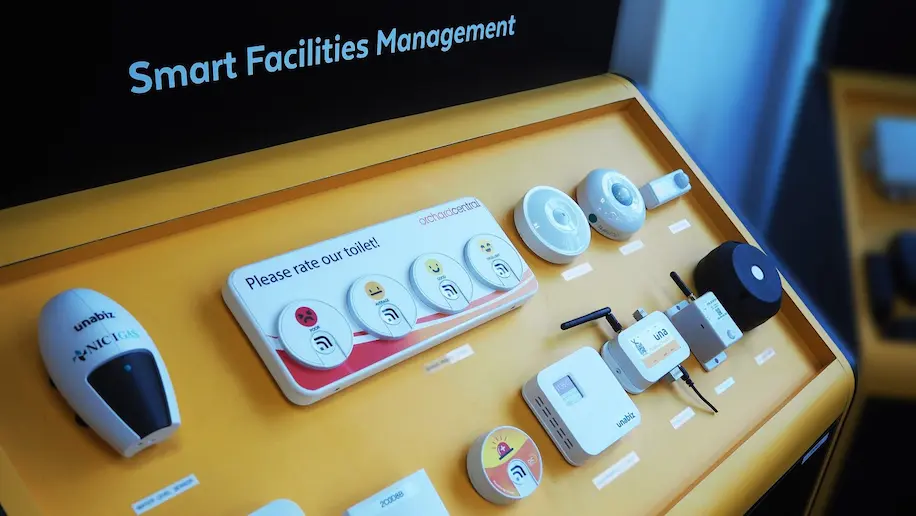
From the energy market to the logistics industry, building management and agriculture, homegrown businesses Azendian, iAPPS and UnaBiz are taking a step forward to combat the climate crisis.
As the world confronts the growing threat of climate change, there is an increasing need for technology solutions that can help support the sustainability goals of businesses and governments worldwide.
In Singapore, a number of local tech firms have put sustainability at the heart of what they do, and seen their innovations take flight in South-east Asia and beyond.
Here is a closer look at how three tech companies’ innovations are helping to build a cleaner and greener future.
Plug-and-play AI platform optimises energy consumption in buildings

Buildings are among the most significant contributors to energy consumption in cities and having greener building management systems can help to significantly cut carbon emissions.
Heating, ventilation and air conditioning (HVAC) systems, which make up about 60 per cent of a building’s total energy consumption on average, offer the biggest potential for energy savings. But this may be difficult to optimise manually as variations in factors like occupancy and weather can drastically affect optimal cooling levels.
Azendian’s AI-based, data-driven solutions take the guesswork out of the equation.
Founded in 2015, Azendian started out as a consulting and data analytics company. Recognising that artificial intelligence (AI) can solve the common problem of energy optimisation in the built environment sector, the company developed a platform called Azendian Estate in 2019.
Azendian’s brand-agnostic, unified platform can extract data in real-time across different assets in multiple geographies into a standardised data lake. The solution can be incorporated into existing operational technology systems used to manage building functions like HVAC, elevators and fire control systems in a plug-and-play fashion. Set-up and configuration take less than a week, and the system does not require human input or intervention to operate once it is up and running. The platform’s AI algorithms help to optimise energy use, conduct fault detection and carry out predictive maintenance as well as workforce and equipment productivity enhancements.
Using machine learning, Azendian’s platform autonomously adjusts a building’s HVAC system to optimise energy consumption, without compromising indoor air quality and comfort.
Mr Bill Lee, founder and managing director of Azendian, says the platform has a self-learning algorithm which makes it more accurate at predicting the optimal settings over time. It is also compatible with any brand of building management system that building owners may already be using.
With the aim of driving efficiency through digitalisation, Keppel Infrastructure (KI), chose Azendian Estate as a platform to centralise KI’s control centres. Through the platform, KI staff can monitor live data from various facilities like district cooling and power generation plants and reduce the number of onsite staff. Another customer, Malaysian conglomerate Sunway Berhad, uses the platform to monitor and manage its various residential, commercial, retail, leisure and healthcare properties.
In our experience, this solution can save our customers up to 25 per cent of the energy used on their HVAC systems.
Mr Bill Lee
Founder and Managing Director of Azendian
Another advantage of Azendian’s solution is its ability to detect and predict equipment faults based on anomalies in energy usage, temperature and other metrics, enabling the building owner to conduct predictive maintenance.
The development of the Azendian Estate platform was supported by Digital Industry Singapore (DISG), a joint office of the Singapore government set up to drive the growth of the tech sector. Mr Lee says DISG helped the company scope out the commercial potential of the platform during the innovation phase and pointed Azendian to opportunities overseas.
Today, Azendian has expanded to regional countries like Malaysia, Australia and Japan.
“When we ventured overseas, DISG supported us in our market studies, events and trade fairs. This was very important for us to build mindshare and let people know that we were coming to their market and what our capabilities were,” Mr Lee adds.
Blockchain system tracks sustainable produce from farm to table

Agriculture is another area where much can be done to cut carbon emissions associated with food production.
As consumers become more aware of the impact of their purchasing choices on the environment, food producers are increasingly expected to ensure their entire supply chains are sustainable. There is also a growing focus on green finance to support companies and producers that contribute to better environmental outcomes.
Despite these trends, the complexity of global supply chains makes it challenging for farmers, food companies and retailers to ensure or prove that their products are sustainably produced and access financing opportunities. Understanding this challenge, iAPPS, with the support of DISG, developed AgriON, a financial technology (fintech) platform powered by blockchain, to empower farmers like palm oil producers, food traders and non-governmental organisations (NGOs) with data-driven insights to make this green transition.
The platform can record data from the sales of agricultural products, including sales volume and farm output levels, as well as information such as crops’ location of origin, types of fertilisers used, and farming-related deforestation.
A sustainability score is calculated based on the available data, which enables financial institutions as well as buyers to assess how sustainable a particular product or producer is. The scoring system was developed in collaboration with the National University of Singapore Risk Management Institute.
The platform can also be used to disburse loans to farmers through cashless payments, functioning as an online marketplace and e-wallet. Farmers are enabled to improve the quantity and quality of their crops by purchasing better seeds, fertiliser and farming tools, as well as better manage bill payments and loan repayments.
Meanwhile, the platform also helps lenders conduct risk assessment better and avoid giving out non-performing loans. Distributors also benefit from improved traceability of the products they buy and sell, as well as forecasting and monitoring of any changes in supply.
iAPPS has ventured overseas with its AgriON solution. In Indonesia, it has been used for about five years and is integrated with the country’s banking infrastructure.
When iAPPS decided to enter the Indonesian market, DISG introduced the company to business partners and helped it navigate the local regulatory systems.
Some of the larger companies working with iAPPS include multinational consumer goods company Unilever and Musim Mas Group, a major Indonesian player in the global palm oil refining industry and a manufacturer of consumer goods.
Ms Lilian Koh, founding chairman and group CEO of iAPPS, says larger companies like these are increasingly concerned about not only their own direct and indirect carbon emissions, but also that of their suppliers and clients. It is now standard practice for many companies to disclose their Scope 3 emissions, or the upstream and downstream emissions that occur in their value chain.
However, the scoring system created by iAPPS is not aimed at penalising or blacklisting farmers for not adopting sustainable practices, Ms Koh notes. Instead, it helps them identify areas where they can improve, which will make them more appealing to downstream partners concerned about sustainability, help them access financing more easily and improve their credit score.
Without a good credit score, the farmers have to pay interest rates as high as 5 per cent a month, or 60 per cent a year, which is not sustainable and keeps them in a cycle of poverty.
Ms Lilian Koh
Founding Chairman and Group CEO of iAPPS
iAPPS focuses on incentivising farmers to meet No Deforestation, No Peat and No Exploitation (NDPE) commitments. The use of blockchain ensures that records cannot be altered, deleted or destroyed, and ties the movement of money to the exchange of data, reducing the friction of interbank transfers, Ms Koh notes.
With technology increasingly being seen and used as a tool to combat climate change, DISG has been working closely with local tech companies on their product development and efforts to develop sustainability solutions, as well as plans to scale their businesses internationally.
Ms Koh adds that DISG previously helped support its efforts to set up offices in China. The company is also looking forward to expanding the AgriON platform to Cambodia and Vietnam with the support of DISG.
Low-energy IoT network powers millions of devices globally

While many telecommunications companies are chasing faster data transmission with technology like “5G” networks, not every operation requires top speeds and large bandwidths.
A “0G” network remains useful for applications where operating on low power is more important than high frequency and large bandwidth data transmission. One such instance is when there is a need for a massive number of devices to be deployed across vast distances and over long periods of time without maintenance.
This is one of the technology solutions offered by Singapore-based Internet-of-Things (IoT) specialist UnaBiz, which owns the global Sigfox “0G” network that powers more than 10 million devices across 72 countries.
One example is smart gas meters, which are small, highly energy-efficient and durable devices used to remotely monitor fuel consumption when connected to the 0G network.
Japanese energy retailer Nicigas, one of UnaBiz’s customers, uses 0G-enabled smart gas meters to accurately keep track of more than 1.2 million residential and commercial liquid petroleum gas (LPG) users.
UnaBiz co-founder and co-CEO Henri Bong says Nicigas was able to reduce deliveries of gas canisters by over 40 per cent and save 10 million yen (S$100,000) a year on manpower costs after adopting the smart gas meters.
Previously, gas meters had to be checked manually on a monthly basis and delivery operations were inefficient as new LPG canisters had to be delivered every two to three months, on a fixed schedule, even if the users had not used up all the gas in their old canisters.
Saving 40 per cent of their logistics means saving 40 per cent of their carbon footprint in terms of the trucks used to make the deliveries and the petrol that they consumed.
Mr Henri Bong
UnaBiz co-founder and co-CEO
Founded in 2017, UnaBiz has come a long way, from when it first started out as a major user of the 0G technology, before acquiring ownership of the technology from French IoT firm Sigfox last April. Today, UnaBiz has offices in Singapore, France, Taiwan, Japan, the Netherlands and Spain.
Mr Bong says the company might not have been successful in its bid to acquire Sigfox if not for the support it received from DISG.
He adds: “DISG introduced us to big corporations and gave us the opportunities we needed to succeed as a start-up. We also leveraged DISG’s support to expand overseas, especially in Asia-Pacific, and build up our credibility.” Today, DISG continues to engage UnaBiz closely, to better understand their research and development plans and explore how they can be supported on their innovation journey to develop new products.
Currently, UnaBiz is researching low-power “green batteries” that can operate without lithium to power trackers that can help companies keep track of packages and shipping containers that move across countries.
Mr Bong says that this is part of the company’s efforts to improve the sustainability of the 0G devices it supports by designing components that are easier to recycle, or that can be disposed of at the end of their lifespan with minimal impact on the environment.
DISG has given local firms a boost in many ways, one of which is identifying platforms for tech companies to pitch their solutions to potential customers and network with other tech players to explore tech collaboration opportunities.
One example is the most recent 2022 World Cities Summit (WCS) in Singapore, where the three firms Azendian, iAPPS and UnaBiz were among the companies nominated by DISG to showcase their tech solutions and demonstrate how emerging technologies like IoT, AI and blockchain can help the world build a cleaner and greener future.
Digital Industry Singapore (DISG) is a joint office of the Economic Development Board, Enterprise Singapore, and Info-communications Media Development Authority, established to support the growth of the technology sector in Singapore.
Learn more about DISG.
Footnote
Source: The Business Times & SPH Media Limited. Permission required for reproduction.


.webp)